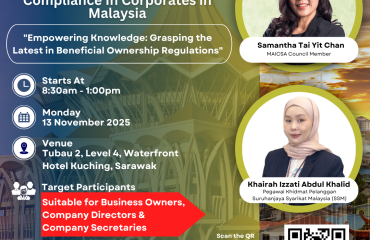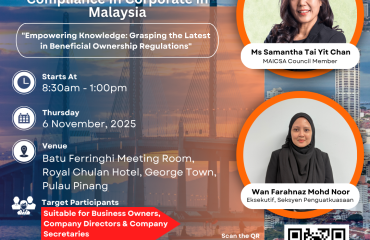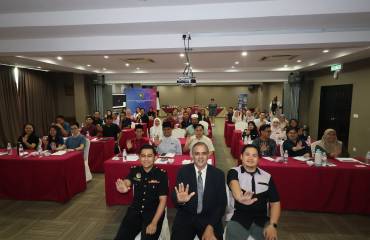Reinforcing the Spirit of Integrity: A National Call to Sustain Reform and Institutional Continuity
Kuala Lumpur – Transparency International Malaysia (TI-M) joins Malaysians across the nation in acknowledging the timely and sobering remarks by His Royal Highness, Sultan Nazrin Muizzuddin Shah, who warned of a deep erosion in Malaysia’s institutional integrity and governance values.
His Royal Highness’ reflection on how Malaysia’s “walls of integrity” are crumbling not from external forces but from within — “the gates were opened from within… what failed was not the stone, but the spirit”— reminds us that the real battle is moral, systemic, and institutional.
The sentiments expressed resonate powerfully with TI-M’s mission. For over two decades, TI-M has played an active role in shaping Malaysia’s integrity landscape, beginning with the development of the National Integrity Plan (NIP) and the founding of the Institut Integriti Malaysia (IIM) under the PIN framework. While each government has introduced its own strategic roadmap—from the Government Transformation Programme (GTP) to the National Anti-Corruption Plan (NACP)— there is often a troubling disconnect between successive reform blueprints and the institutional foundations laid before them.
“The challenge we face is not a lack of plans—but a lack of continuity, coordination, and sustained commitment,” said Raymon Ram, President of Transparency International Malaysia. “We cannot afford to restart the integrity agenda every time a new administration takes office. There must be consistent implementation, evaluation, and ownership of reforms across political cycles. The people deserve nothing less.”
A Fragile Landscape Demands Firm Action
Malaysia’s current standing in Transparency International’s Corruption Perceptions Index (CPI)—stuck at 50/100 and ranked 57th out of 180 countries—is emblematic of stalled reform and eroded public trust. The Global Corruption Barometer shows 71% of Malaysians see government corruption as a serious problem. From procurement mismanagement to leakages in public spending, these realities continue to surface year after year in Auditor-General reports without meaningful consequences.
TI-M acknowledges the positive legislative steps taken, including the 2025 amendment to the Whistleblower Protection Act, passed unanimously by Parliament. This represents a critical step in protecting individuals who expose misconduct. However, as Raymon emphasized, “One good law does not fix a broken system. Isolated reforms without a clear, coherent strategy will not change the culture of impunity.”
TI-M’s Priority Reform Agenda
In moving from rhetoric to results, TI-M reiterates the need for a comprehensive, coordinated national reform strategy that addresses core structural gaps and institutional weaknesses. Our
reform priorities include:
● Beneficial Ownership (BO) Transparency: Enforce public access to BO registries for companies and trusts, ensuring recent Companies Act amendments are meaningfully implemented to stop illicit enrichment via opaque structures.
● Public Procurement Reform: Enact a Public Procurement Act that embeds open contracting, e-tendering, and mandatory Integrity Pacts with independent oversight for all high-risk projects. Public contracting must operate above discretion and beyond ministerial exemptions.
● Political Financing Law: Introduce a long-delayed Political Financing Act to regulate donations and campaign spending. As Raymon noted, “Until we clean up political money, we cannot claim to be cleaning up governance.”
● Federal Freedom of Information (FOI) Act: Guarantee the rakyat’s right to know by legislating proactive transparency, open data, and institutional disclosure. FOI is essential to preventing corruption before it begins.
● Independent Ombudsman Office: Establish an autonomous Federal Ombudsman to handle public grievances, with powers to investigate maladministration and systemic failure.
● Independence and Separation of Attorney General and Public Prosecutor: Fulfil the long-standing promise to divide the AG’s legal advisory role from the Public Prosecutor’s prosecutorial function. Both positions must be independent from interference by any elected representative and report to parliament. This step is vital for impartial, depoliticized justice.
● Corporate Liability and Deferred Prosecution Agreements (DPA): Define a clear and robust DPA mechanism to strengthen dissuasive enforcement of corporate corruption, encouraging self-disclosure and compliance reforms without bypassing accountability.
Sustaining the Reform Spirit Beyond Administrations
TI-M notes that several of these reforms have already been discussed, with some legislative groundwork laid. However, successive administrations must align efforts rather than reset them. Reform continuity—not reinvention—is what builds resilient institutions.
“We cannot afford for each reform cycle to begin with tearing down what came before,” said Raymon.
“Malaysia’s anti-corruption architecture must be built like a fortress—brick by brick, not blueprint
by blueprint. The rakyat expects action, not a revolving door of unfulfilled plans.”
A National Responsibility
TI-M calls on all stakeholders to rise to this moment of reckoning:
● Government and policymakers must accelerate key reforms and publish clear implementation timelines, especially under the evolving National Anti-Corruption Strategy
(NACS).
● Enforcement bodies must apply the law impartially and transparently—justice must not only be done, it must be seen to be done.
● Civil society and the media must hold institutions accountable and foster a culture of vigilance.
● Citizens must refuse complicity, report wrongdoing, and demand leadership that values integrity over power.
Conclusion
Malaysia’s reform journey has been long, but it cannot be aimless. As HRH Sultan Nazrin reminded us, the threat is not just external—but within. To guard the gates, we must revive the spirit of integrity that once defined our aspirations.
“Let this moment be the pivot,” concluded Raymon Ram. “A pivot from political expediency to
institutional resilience. From plans on paper to results on the ground. Malaysia must not be
remembered for her tolerance of corruption, but for her refusal to be defined by it.”
Transparency International Malaysia remains committed to supporting, tracking, and advocating for these reforms in partnership with government, institutions, and the people of Malaysia.
Issued by:
Raymon Ram
President
Transparency International Malaysia (TI-M)







